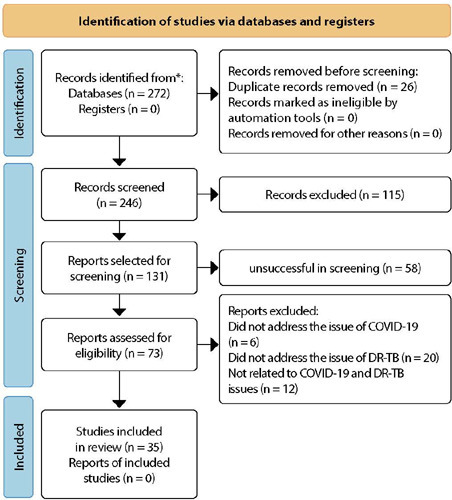-
REVIEW
Drug-Resistant Tuberculosis and COVID-19: A Scoping Review on a New Threat to Antimicrobial Resistance
Revista Brasileira de Enfermagem. 2023;76(Suppl 1):e20220803
12-04-2023
Abstract
REVIEWDrug-Resistant Tuberculosis and COVID-19: A Scoping Review on a New Threat to Antimicrobial Resistance
Revista Brasileira de Enfermagem. 2023;76(Suppl 1):e20220803
12-04-2023DOI 10.1590/0034-7167-2022-0803
Views0ABSTRACT
Objective:
To assess the impact of COVID-19 on the morbidity and mortality associated with drug-resistant tuberculosis (DR-TB).
Methods:
A comprehensive review of articles published in international databases since December 2019 was conducted. The findings are presented in a narrative format, supplemented with tables, diagrams, and a map created using ArcGIS software.
Results:
Thirty-five studies were selected, highlighting the significant consequences of COVID-19 on TB and DR-TB treatment progress. Four main thematic areas were identified: Clinical and epidemiological aspects of the interaction between COVID-19 and DR-TB; Management of physical resources and the team; Challenges and circumstances; Perspectives and possibilities.
Conclusions:
This study revealed that the COVID-19 pandemic significantly negatively impacted the control of long-standing diseases like TB, particularly in the context of morbidity and mortality related to DR-TB.
Keywords:COVID-19Extensively Drug-Resistant TuberculosisMicrobial Drug ResistanceMultidrug-Resistant TuberculosisTuberculosisSee more
-
ORIGINAL ARTICLE
Fatores associados à infecção por Staphylococcus aureus resistente à meticilina em unidade de terapia intensiva
Revista Brasileira de Enfermagem. 2020;73(6):e20190483
09-07-2020
Abstract
ORIGINAL ARTICLEFatores associados à infecção por Staphylococcus aureus resistente à meticilina em unidade de terapia intensiva
Revista Brasileira de Enfermagem. 2020;73(6):e20190483
09-07-2020DOI 10.1590/0034-7167-2019-0483
Views0See moreABSTRACT
Objective:
To identify factors associated with methicillin-resistant Staphylococcus aureus (MRSA) infection in adult patients admitted to the Intensive Care Unit (ICU), and to compare them with a control group.
Methods:
Retrospective case-control study carried out in an adult ICU, from January 2015 to June 2017, with 61 patients who developed methicillin-resistant Staphylococcus aureus infection and the same number of control patients.
Results:
Most participants were male 65 (60.6%), with a neurological diagnosis 43 (35.2%) and hypertensive 61 (50.0%). In the comparison of the groups, there was a statistically significant difference in relation to mechanical ventilation (p=0.0107), tracheostomy (p=0.0083), death (p=0.0401), urinary catheter (p=0.0420), length of stay (p<0.0001) and severity (p=0.0003). The main factors associated with methicillin-resistant Staphylococcus aureus infection were: severity (OR= 65.69; CI=3.726-4.808; p=0.0018), use of antimicrobials (OR= 0.047;CI=0.028-0.122;p=0.0024), length of stay (OR=1.19; CI=0.952-1.031; p=0.0285).
Conclusion:
methicillin-resistant Staphylococcus aureus infection is multifactorial and has been associated with length of stay and severity. Use of antimicrobials was a protective factor.



